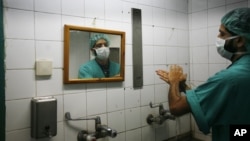The World Health Organization (WHO) warns millions of people die every year from preventable surgical infections. A WHO report says new global guidelines it is issuing for the prevention of surgical site infections will save many lives.
The WHO reports more than 240 million surgical procedures are performed globally every year for a wide range of conditions, including cancer, heart disease, cataracts and traffic crash injuries.
Surgical site infections occur when bacteria enter a patient’s body through incisions. They threaten the lives of millions of patients each year and contribute to the spread of antibiotic resistance.
The U.N. Agency says they are the most common hospital-acquired infection in poor countries and the second most common in rich countries.
WHO Director of Service Delivery and Safety Ed Kelley says one in every 10 surgical patients in poor countries will get an infection. In some countries he says one third of all patients coming in for surgery are infected.
“In Africa, for instance, 20 percent of Caesarian sections result in surgical site infections, which endanger, of course, the life of the woman and, therefore, the life of her baby. These result in hundreds of thousands of extra hospital days, billions of dollars in extra hospital costs and tens of thousands of deaths,” Kelley said.
The new guidelines cover 29 recommendations in 23 areas. Kelley says evidence shows that antibiotics given as close as possible before surgery can prevent infections for certain surgical procedures. But he says using antibiotics after surgery does not prevent infections. Another recommendation, he says, is not to shave patients before surgery.
“Hair removal can actually increase the risk of causing microscopic cuts or traumas to the skin and evidence tells us that there is clear benefit to not removing the hair.... If you had to boil it down globally as to what could have some of the biggest impact, this question of proper site preparation, proper hand hygiene and really, then, the layout of the operating theater in terms of preventing infections,” Kelly said.
Of the 29 recommendations in the guidelines, health officials cite hand-washing as the single most important for preventing surgical site infections.




